The Maruha Nichiro Group’s Mission to Sustainably Supply Marine Products for the Next 100 Years
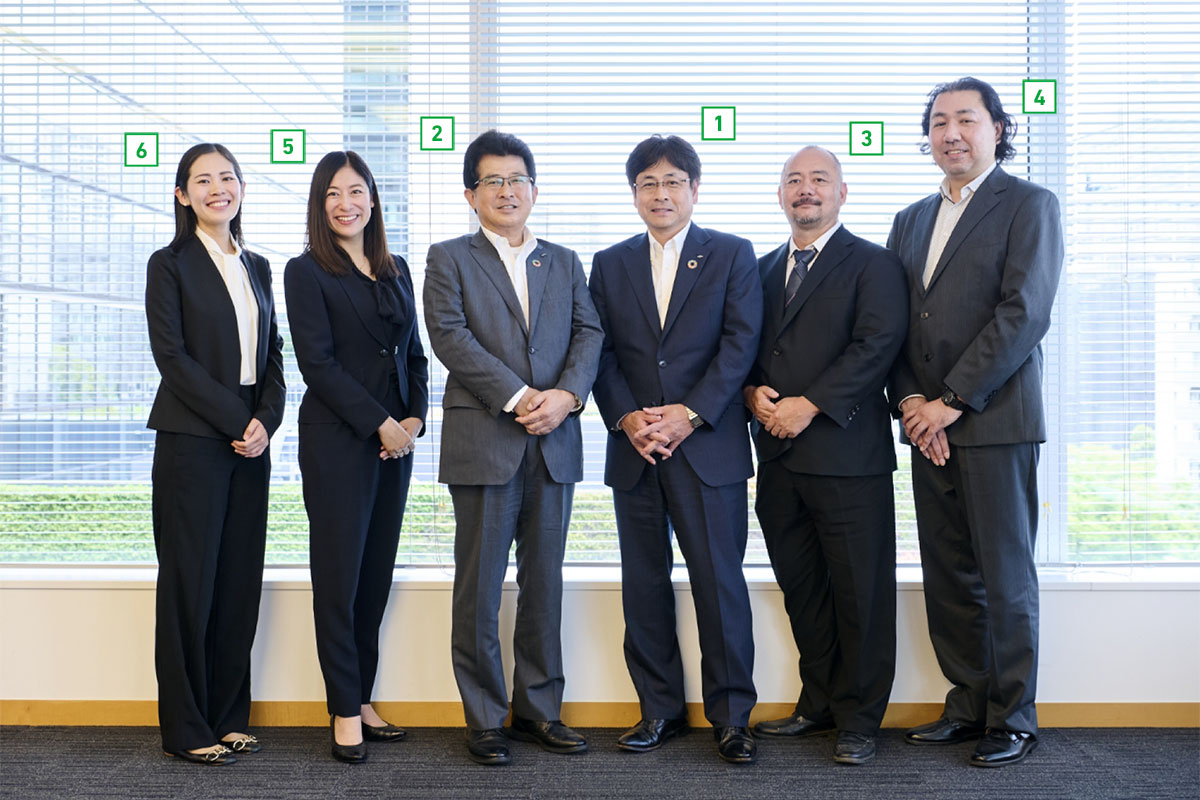
The marine products handled by the Maruha Nichiro Group are a valuable source of high-nutritional protein, and we consider their provision to be a vital mission of the Group. However, their sustainable supply faces a number of risks and opportunities. We exchanged opinions with outside experts who have specialized knowledge and broad insights on ways to mitigate risks and leverage opportunities for supplying marine products sustainably.
- 1Kenji Funaki
- Director, Managing Executive Officer, and Director of Marine Resources
- Business Segment
- Maruha Nichiro Corporation
- 2Daisuke Yasuda
- Managing Executive Officer and Director of Foodstuff Distribution
- Business Segment
- Maruha Nichiro Corporation
- 3Satoshi Maekawa
- Lead, Oceans and Fisheries Group, First Nature Conservation Division
- WWF Japan (World Wide Fund for Nature Japan)
- Promotes and helps obtain seafood eco-labels. Member of the Council for Promotion of the Industrialization of Aquaculture Growth.
- 4Mutai Hashimoto
- Lead, Sustainable Finance Group, First Nature Conservation Division
- WWF Japan (World Wide Fund for Nature Japan)
- Master’s in Environmental Management, The University of Nottingham, UK. Has been in his current position since July 2021.
- 5Rika Sueyoshi
- Director General
- Ethical Association
- Established Ethical Association in 2015. Promotes and raises awareness of ethical concepts and ethical consumption through courses, lectures, policy recommendations, textbook writing, and more.
- 6Asuna Okubo
- Director
- Ethical Association
- Principal, Owls Consulting Group, Inc. Possesses knowledge on a range of sustainability topics and experience in strategic projects.
Mitigating the Risks Facing Wild Marine Resources and Aquaculture:
Verification of wild marine resource quantities and establishment of voluntary management standards for aquaculture farms
-
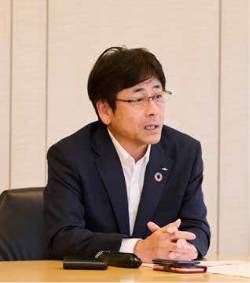
- Funaki:
- The Group, both in the past and now, identifies its primary mission as providing society with a stable and sustainable supply of marine products, which are a valuable source of protein.
However, there are several risks to fulfilling this mission. One is depletion of wild capture marine products. Because of it's unstable quantities, we worry that it will become increasingly difficult or even impossible to catch these products. Furthermore, as resource surveys are inadequate, we cannot accurately grasp the state of these resources, making it difficult to take appropriate measures. This poses a major challenge for mitigating this risk. The second risk is related to aquaculture. There is a risk that aquaculture farms may disrupt local ecosystems. Additionally, depending on how antibiotics are used, there is a risk of proliferation of antibiotic-resistant bacteria. There is also the potential risk of marine resources decreasing due to the overfishing of wild capture marine products, which become feedstuff for farmed fish.
-
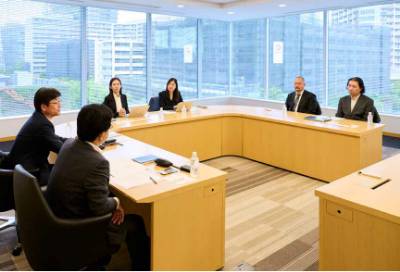
- Maekawa:
- The decline in wild capture marine resources has been pointed out for some time, but it seems to have become more pronounced in the last few years. With catch volumes decreasing, fishing is no longer possible or sustainable in various regions. First of all, over 30% of the areas in the world are overfished, and there is massive fish consumption, particularly in countries like China and India. Additionally, global warming is altering the marine environment, affecting aquaculture and coastal fisheries. As you indicated, not knowing resource quantities has hindered resource recovery measures, which is one of the factors compounding the risks. How the international community and Japanese companies maintain the sustainability of marine resources is becoming more critical than ever. In Japan, the revision of the Fishery Act in 2020 introduced Western-style fishery management, in which resource quantities are determined before catch volumes are set. There are many fish species that have not even been surveyed yet, and ensuring their quantities will be a significant challenge.
-
- Funaki:
- In the United States and Norway, the government sets allowable catch quotas based on resource surveys, and allocates these quotas to private fishing vessels to manage their resources.In contrast, in Japan, all we hear is that “fish are disappearing rapidly.” To address the risk of depletion of wild capture marine products, we conduct resource surveys of the marine products we handle. The survey results are shared with affiliated companies and related departments to identify issues and make improvements. One of our KPIs related to these surveys is “resource status confirmation rate of handled marine products: 100% by FY2030.” For aquaculture, we believe that management at the ASC-certification*1 level will contribute to risk mitigation. Among our main farmed fish, yellowtail and amberjack have already obtained ASC-certification at some aquaculture farms. Since there is no certification standard for tuna, we have established voluntary management standards that align with ASC-certification and implemented them across the Group’s 13 aquaculture farms.
- *1 ASC certification: This international certification program for aquaculture is managed and run by the Aquaculture Stewardship Council (ASC). Certification requires that farms are preventing environmental pollution and overuse of resources, as well establishing honest relationships with workers and local residents.
MSC certification: Certification for sustainable fishing administered by the Marine Stewardship Council (MSC), an international non-profit organization. The MSC blue fish label is applied to seafood that has been caught in a sustainable MSC-certified fishery that minimizes impact on marine resources and the environment.
-

- Maekawa:
- For a company like Maruha Nichiro, which handles a wide variety of fish species worldwide, aiming for “100% resource status confirmation rate” is very progressive and challenging. I hope you continue to set an example as a leading company in the world. At the same time, I ask that you also pay attention to whether any risks might arise for the species that are already being managed. With regard to aquaculture, I agree that establishing strict voluntary standards is one way of managing them. However, saying that these voluntary standards are equivalent to ASC-certification may mislead consumers, so caution is needed.
- The Marine Resources Situation
- The overexploitation of marine resources is recognized as an urgent global issue requiring immediate action. According to data released by FAO (Food and Agriculture Organization of the United Nations), 28% of marine resources are either depleted or severely overfished, while over 50% cannot increase production beyond current levels, necessitating a proper system for resource management. Meanwhile, global market trends show that marine resource competition has begun across the world.
To Eliminate Involvement in IUU Fishing and Human Rights Violations Through Procuring Marine Products:
Ensuring traceability of marine products and the announcement of a procurement policy for marine products
-
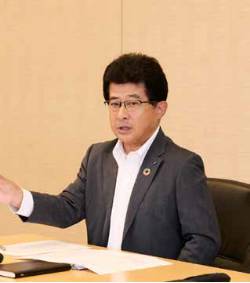
- Yasuda:
- We realize that procuring marine products runs the risk of engaging in IUU fishing and human rights violations. The Group is taking steps to ensure traceability to demonstrate to our customers that Maruha Nichiro is a company that does not handle marine products involving IUU fishing, child labor, or forced labor from the outset. It is also meant to demonstrate the Group’s commitment to our global suppliers. The Marine Products Trading Unit that I oversee, with the cooperation of our suppliers, has been enhancing its efforts for responsible labeling, indicating where a fish was caught and where it was processed before it reaches consumers. Alongside developing a traceability system, we plan to announce a new procurement policy specifically for marine products this September. We will make this clear procurement policy known within and outside the Company and ensure its implementation.
-
- Maekawa:
- IUU fishing is an old and deeply rooted issue. While it must be eliminated, we fully understand the difficulty of achieving zero IUU fishing. As a first step, as you mentioned, it is important to issue a statement that Maruha Nichiro “does not handle products derived from IUU fishing.” As to how to eliminate it specifically, there is significant meaning in approaching the government and corporate supply chains. Beyond simply creating guidelines and asking for compliance, Maruha Nichiro staff need to visit the sites and conduct interviews. Ensuring traceability is not a distant goal if your company does not work alone but also collaborates with other major enterprises and large distribution companies. We would certainly like to assist.
-

- Okubo:
- Human rights issues in the fishing and marine product processing industries are becoming an increasingly important topic. My understanding is that, the further upstream you go, the more complex the supply chain becomes and grasping the supply chain itself becomes challenging. Among the issues, human rights violations on fishing vessels are considered extremely difficult to detect. The disclosure of Maruha Nichiro’s procurement policy for marine products is a very important initiative. To realize this policy, it is critical that you manage the supply chain. Specifically, it is important to communicate with suppliers and not only address actualized risks but also identify potential risks and take appropriate measures. For actualized risks, it is crucial to consider how remedies will be provided to victims of human rights violations. Especially in cases of IUU fishing, workers are often placed in vulnerable environments, and their chances of forced labor are high. As a remedy measure, I advise Maruha Nichiro to consider establishing a grievance mechanism through which workers can consult and file reports.
- IUU Fishing and Human Rights Issues
- IUU fishing stands for illegal, unreported, and unregulated fishing. It includes not only poaching but also inaccurate and underreported fishing, fishing by vessels of non-flag states, and fishing by unauthorized vessels in areas managed by regional fisheries management organizations (RFMOs). In recent years, human rights violations against crew members, fisheries observers, and processing plant and other workers have been raised as an issue of particular concern relating to IUU fishing. Specifically, cases where foreign crew members on pelagic tuna fishing vessels are forced to work long hours and have their passports confiscated, or are subjected to physical abuse, have been reported, as well as child labor at processing plants for farmed shrimp in Southeast Asia.
Information Disclosure Using the TNFD International Biodiversity Framework:
A tool to represent the Maruha Nichiro Group’s sustainability initiatives
-
- Funaki:
- The complete version of the TNFD framework*2 was released in September of last year. From then on, we began to hold a study session for Officers, a study session for employees, among other activities. In 2024, we held a workshop to analyze and map impacts and dependencies for each business. Based on that, we are assessing businesses with high dependencies and impacts, namely, Alaska pollock fishing and the Group’s farming of bluefin tuna, amberjack, and yellowtail. In terms of TNFD’s LEAP approach, by September 2024, we plan to disclose up to Locate (identifying high-impact and high-dependency businesses and areas, such as Japanese aquaculture and the North American Alaska pollock business) and Evaluate (evaluating a business’s dependencies and impacts on biodiversity).
- *2 A tool for assessing and reporting how a company’s business activities are linked to the environment and biodiversity and what risks and opportunities they present
-
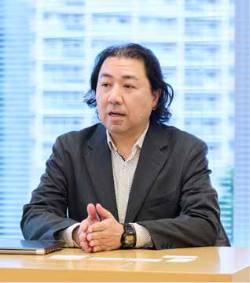
- Hashimoto:
- I think it is outstanding that you intend to make disclosures actively from a very early stage. On the other hand, TNFD tends to be perceived as “another new set of guidelines.” Maruha Nichiro is already making progress on disclosures that TNFD is intended for, such as traceability, human rights issues, and marine resource quantity. Therefore, I encourage you not to be overly cautious and to use TNFD as an opportunity to reveal what you have been regarding as materiality. As part of TNFD, I would also like to see disclosures on the goal of your marine resources survey, “resource status confirmation rate of handled marine products: 100% by FY2030.”
To Turn Ethical Consumption of Marine Products into a Market Opportunity:
Raising awareness of MSC and ASC certified products in Japan and creating opportunities for customers to choose them
-
- Yasuda:
- We have kept on offering MSC- and ASC-certified products, believing that increasing ethical consumption of marine products could bring opportunities to the Group. However, it is still only a small group of customers who are committed to ethical consumption. We have to not only work alone, but also collaborate with industry peers and distribution customers to inform consumers about what MSC- and ASC-certifications are.
-

- Sueyoshi:
- From 2019 to 2021, our organization conducted a survey on ethical consumption trends among more than 6,000 people in Japan, ranging from the 10 to 19 age group to 70s and older. To about 30% of the respondents who were committed to ethical consumption, we asked what information they refer to for such consumption. The top response was “certification label.” We found out that certification labels have influence as a purchasing trigger for those who are already conscious of ethical consumption. Nevertheless, it seems that the discussion has become an ongoing cycle with companies saying, “We won’t put certification labels because consumers don’t buy the products,” and consumers saying, “I will buy them if they are available, but such products are not very accessible.”
-
- Yasuda:
- Certified products include not only products for general consumers but also institutional-use products for businesses, such as hotels and food services. Communicating this to customers has also been a major challenge. Even if we put certification labels on large packaging, they are discarded before customers see them. Therefore, we plan to enhance our communication for institutional-use products, including their packaging, and propose menu ideas that bring out the quality of the ingredients.
-
- Sueyoshi:
- I agree. Visibility is extremely important. Ethical consumption has begun to be covered in junior high school textbooks in 2021 and in high school textbooks in 2022. Various certification labels are also mentioned. Young people, who will be the core consumers in 10 to 20 years, are learning about ethical consumption before adults do and are called “ethical natives.” Certification labels are easily recognizable when you pick up a product with your hand. I believe they are an effective means to gain the empathy and confidence of consumers.
-
- Yasuda:
- To turn the increase in ethical consumption into an opportunity for company growth, in FY2025 we will fully launch the food promoting project that contributes to creating health value and sustainability.” By incorporating into our product standards, our countermeasures for risks related to Japanese people’s health issues and food sustainability, and working to expand the sales of products that meet these standards, we will aim to grow as a company that is chosen by our customers.
- Ethical Consumption
- Combined with various nouns, the adjective “ethical” can greatly broaden their meaning. “Ethical consumption” refers to consumption or services that take into account, people, the global environment, and society, including regional revitalization and employment.

